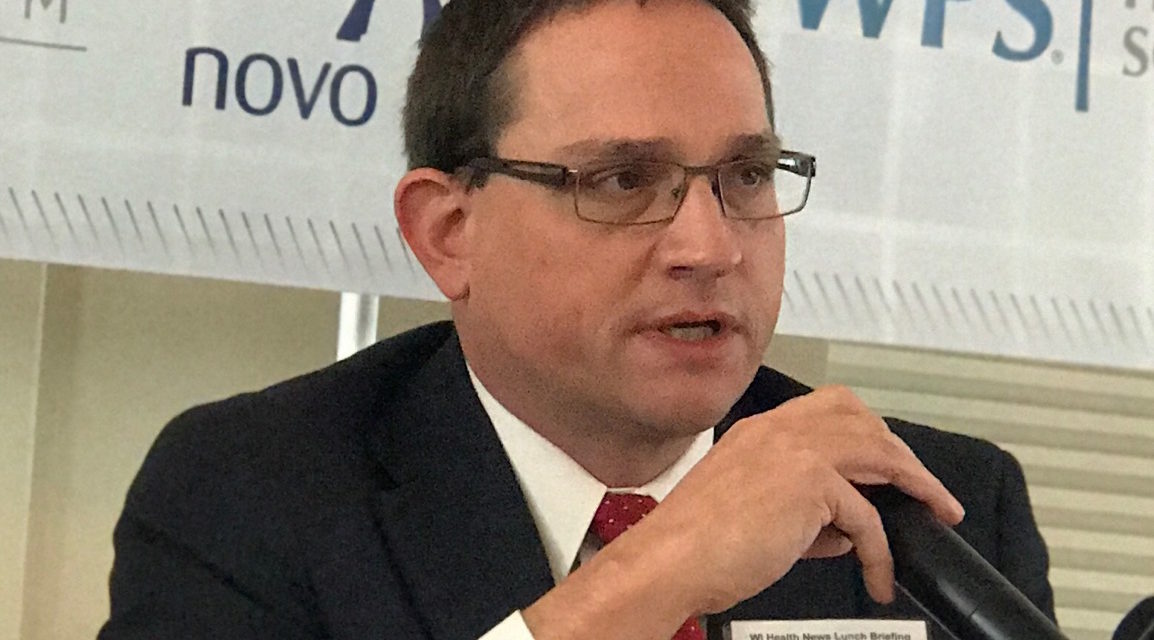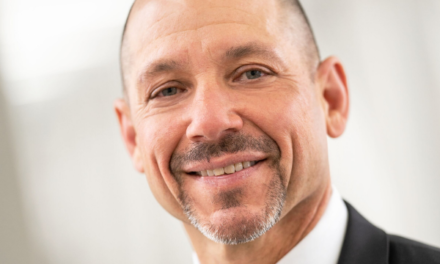
Hospitals wary of Obamacare replacement bill

Image: Wisconsin Hospital Association CEO Eric Borgerding.
Republican House congressional leaders hope to move fast on their Obamacare replacement bill, which has drawn concerns from hospitals and others who say it could penalize and hurt Wisconsin.
House Republican leadership released the bill Monday, with committees set to begin work on the proposal Wednesday. The bill would make structural changes to Medicaid like transitioning it to a per capita cap allotment. The bill would also replace current subsidies based on income with tax credits based on age.
House Speaker Paul Ryan, R-Janesville, said Tuesday they plan to use reconciliation to pass the bill, which requires a majority in the Senate rather than the 60 votes needed to break a potential filibuster.
“Doing big things is never easy,” Ryan said in a statement. “We made a promise to repeal and replace Obamacare with conservative solutions and reforms. That is exactly what this bill does.”
But providers in the state expressed concern the bill would penalize Wisconsin for the way it chose to expand Medicaid. Wisconsin didn’t take enhanced matching funds from the federal government for expansion and pursued eligibility changes to cover more childless adults.
Wisconsin Hospital Association CEO Eric Borgerding said while the bill makes a few steps toward addressing Medicaid funding inequity, the state would get the “short end of the stick.”
Under the bill, if Wisconsin had expanded Medicaid, it would’ve received slightly more than $258 million. Instead, it would get about $60 million, according to WHA’s initial analysis.
“That’s a huge, huge disadvantage for Wisconsin,” he said. “It makes absolutely no sense that a state like Wisconsin that added 130,000 people to Medicaid is going to continue to be put at a funding disadvantage compared to those states that expanded under Obamacare.”
Borgerding called it a positive step that the proposal’s caps on Medicaid appear to differ for various populations. But he raised concerns that increases are indexed to a rate that’s less than medical inflation.
He said another positive is that the bill provides $10 billion for states over five years that didn’t expand Medicaid. But that funding is based on the number of people in the state with income below 138 percent of the federal poverty level, not on how many are covered in the program, he said. That means bigger states may receive most of the money.
Borgerding cautioned that moving away from subsidies for low-income people to purchase coverage for insurance could hurt the state given it relied on those subsidies to make coverage affordable for the people it transitioned off Medicaid when it made eligibility changes.
“If those go away, a significant component of the Wisconsin model also goes away,” he said.
Peggy Troy, CEO of Children’s Hospital of Wisconsin, said children represent about half of Medicaid beneficiaries in the state.
“Any cuts to Medicaid have a disproportionate impact on children,” she said in a statement. “Wisconsin has a track record of providing access to the healthcare kids need while limiting costs. That should not change.”
The bill would also block people with Medicaid coverage from receiving care at Planned Parenthood health centers, which serve 50,000 patients who are Medicaid eligible, according to a statement from the family planning provider.
“Without Planned Parenthood, many Medicaid patients will have no other provider to turn to, putting them at risk for undiagnosed cancers, STDs, unintended pregnancy and other poor health outcomes,” Nicole Safar, government relations director for Planned Parenthood Advocates of Wisconsin, said in a statement.
Jon Peacock, Wisconsin Council on Children and Families research director, said they’re alarmed the bill goes beyond making changes to the federal health reform law and restructures Medicaid. He said the new caps on federal cost-sharing could lead to states rationing care.
“Wisconsin will fare poorly with these caps because we are already well below the national average in spending per Medicaid enrollee,” he said. “We will be penalized for already making cost-effective innovations in long term care that most other states haven’t made yet.”
Peacock noted that the bill could reduce premium assistance for nearly all of the 200,000 Wisconsinites who get premium tax credits as well as eliminating cost-sharing assistance for 129,000 low-income residents.
“This is still very much a moving target,” Dr. Bud Chumbley, chief medical advisor for the Wisconsin Medical Society, said. “With this or any healthcare reform proposal, our paramount concern is the same: to ensure that those who are currently insured do not lose coverage once changes are finalized.”
Gov. Scott Walker called the federal health reform law a “failure” that must be “repealed and replaced.” He called the bill an “important first step” and said he’ll continue working with governors, Congress and the administration on the proposal.
The state’s Democratic congressional delegation blasted the bill. Rep. Mark Pocan, D-Madison, said it would reduce quality, affordability and accessibility of healthcare.
U.S. Rep. Gwen Moore, D-Milwaukee, echoed Pocan’s concerns, calling the proposal a “self-inflicted wound” that could have a “devastating impact.” U.S. Rep. Ron Kind, D-La Crosse, said it could raise insurance premiums and jeopardize care in rural areas.
“The people of Wisconsin did not send me to Washington to take people’s healthcare away,” U.S. Sen. Tammy Baldwin, D-Wis., said in a statement.
Spokespeople for U.S. Rep. Sean Duffy, R-Wausau; U.S. Sen. Ron Johnson, R-Wis; and U.S. Rep. Jim Sensenbrenner, R-Menomonee Falls, said they’re reviewing the legislation and haven’t taken a position.
A spokeswoman for U.S. Rep. Glenn Grothman, R-Glenbeulah, said she hadn’t spoken with the congressman about his position yet. Grothman raised concerns about a previous draft of the bill and the impacts it could have on employer-sponsored coverage.
A spokeswoman for U.S. Rep. Mike Gallagher, R-Green Bay, did not provide comment by deadline.





